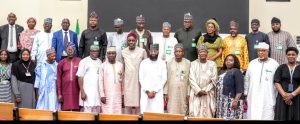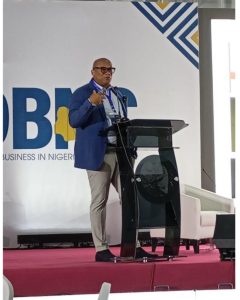#NES25: Hands off anything that concerns industrialization, Doyin Salmi urges FG

…as Awosika of FirstBank wants financial inclusion at center of Nigeria’s economic policies
By Afusat Adeoluwa
An economist and Chairman of the Presidential Economic Advisory Council (EAC), Prof. Doyin Salami has said that it is time for the government to hands off anything that concerns industrialization.
He disclosed this at the ongoing Nigerian Economic Summit (#NES25) in Abuja, where different other finance experts from different economic background have converged to deliberate and proffer solutions to Nigeria’s economic challenges.
The Summit, which has the theme, “Nigeria 2050: Shifting Gears”, is organized by the Nigerian Economic Summit Group (NESG), and headed by Asue Ighodalo.
“With regards to industrialization, the government must get out of the way now. In other parts of the world, what is done is investment, entrepreneurship, risk-taking, job creation and prosperity and it is a process that is driven by the private sector, and what government does is to provide an atmosphere for these policies to thrive.
On education, Nigeria must look at the top and the bottom. At the bottom, we cannot for much longer have the world’s highest number of out of school children, we cannot ignore the challenges that these out of school children can pose to the country whether it is out of school children or the girl child, education must be taken seriously.
From the top, the relevance of science and technology in development processes is relevant and the government must begin to look inward in leveraging on technology to boost communication processes.

In the same vein, the chairman of First Bank of Nigeria, Ibukun Awosika said financial inclusion must be at the heart of Nigeria’s economic policies as it will be the only gateway for development.
“In governance, there are many opportunities for harmonization, Nigeria must have a directional focus both at the federal and sub-national level which will advance development in the country
“We must agree collectively on how to keep our policies moving without disruption and we must work it from federal to state levels because the states are important as almost every citizen of Nigeria lives in the state, under the governance of the state and it is being affected by different policies at the state level,” She said
Awosika added that “We blame the federal government in everything, but in the real sense, people who touch our lives the most are the states, so if we have an economic and educational plan that works, it must be driven from the federal to the state level.
“Also the younger people must be involved. Two young people from each state should be selected to contribute to the processes and the policies of governance as well as investing in women for enlarged growth and development as our greatest assets are our young people and women,”
The first bank chair maintained that for Nigeria to achieve inclusivity, young people and women must be carried along.
Also, the chairman of Dangote Group, Aliko Dangote said for economic growth to be achieved, Nigeria must identify the need to prioritize and promote developmental growth,
He said there is no reason why Nigeria cannot identify key sectors of growth and provide a conducive atmosphere for them to thrive.
Dangote who was represented by the Executive Director of Dangote Group, Ahmed Mansur says about from conventional education, there is a need for Nigeria to focus more on skills acquisition.
“Apart from basic education, we need to create skills and high education. First of all, there is no reason why we won’t improve our human capital development.
“For the Dangote group, with regards to skills, in the last 10 years, we have established a centre that has recruited five hundred young technologists and give them training.
“Also, in the next two years, we’re going to establish a university that will be in the heart of the fourth industrial revolution as it will address the core skill areas and the core knowledge areas that will enhance capacity,” he said.
Similarly, the Chief Executive Officer of Jumia Nigeria, Juliet Anammah says Nigeria must adopt critical thinking in solving economic challenges.
Anammah said such policies must be geared towards the promotion of macro-economic growth and development.
“We need policies that create macro industries that support the macro formation of capital, invest in people to improve capacity and also by bringing people into small sectors that can contribute to national development”
She also harped on the need for the adaptation of technology in driving key reforms of the country.
“Today we talk about infrastructure, transportation among others. But the mobile phone is also important. With the mobile phone, learning can take place through broadband access, as such technology is very relevant to sustainable development,” she added.







